A NOVEL smart bandage can successfully monitor chronic wounds in human patients, detecting inflammatory and infectious biomarkers up to three days before symptoms appear, and predicting healing times with clinical accuracy. This advancement marks a critical step towards real-time, data-driven wound management.
Chronic wounds, often resulting from diabetes or poor circulation, pose significant healthcare challenges due to the difficulty of monitoring healing progress and detecting complications early. Building on 2023 animal trials that demonstrated real-time data collection and accelerated healing, researchers from Caltech and the Keck School of Medicine of USC tested an enhanced version of their smart bandage in 20 human patients with non-healing wounds. The iCares system combines microfluidics, sensor arrays, and machine learning to transform wound care into a precision medicine approach.
The bandage’s three microfluidic components – a superhydrophobic-superhydrophilic Janus membrane, bioinspired wedge channels, and graded micropillars – continuously collect fresh wound exudate while removing excess moisture. This enables its disposable sensor array to measure nitric oxide (inflammation marker) and hydrogen peroxide (infection indicator), alongside pH and temperature, with 95% correlation to laboratory tests. When paired with a machine learning algorithm analysing longitudinal data from human patients, the novel banadage predicted healing timelines with accuracy matching expert clinicians (AUC 0.9-0.92).
For clinical practice, the smart bandage could enable earlier antibiotic interventions, personalised treatment adjustments, and reduced hospital visits through remote monitoring. Integration with electronic health records could automate treatment alerts, though this requires addressing data privacy concerns.
Reference
Wang C et al. A microfluidic wearable device for wound exudate management and analysis in human chronic wounds. Science Translational Medicine. 2025;DOI:10.1126/scitranslmed.adt0882.








